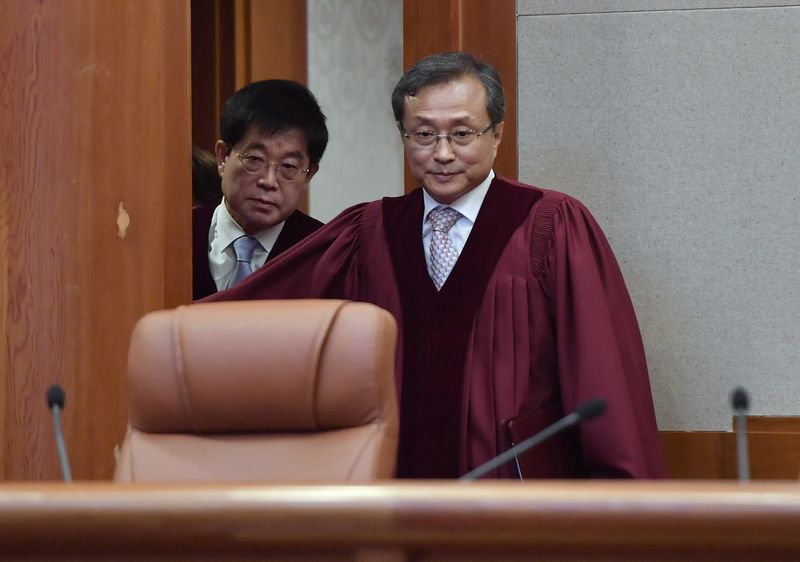By Sangmi Cha
SEOUL (Reuters) - South Korea's Constitutional Court dismissed on Friday an appeal by a group of women forced to work in Japan's wartime military brothels to strike down an agreement signed by the two countries to settle claims over the abuse.
The ruling is expected to have little impact on the 2015 agreement as it has been effectively abandoned by South Korean President Moon Jae-in, who has called it seriously flawed and inadequate to resolve the issue that has been for many years a source of rancor between the neighbors.
Constitutional Court President Yoo Nam-seok said the agreement was a political one that tried to resolve the comfort women issue and, unlike a treaty between two countries, did not create legal responsibilities on the part of the governments.
Comfort women is a euphemism for the thousands of girls and women, most of them Korean, who were forced to work in Japan's brothels before and during World War Two, when Japan occupied Korea.
"It cannot be said that the rights of the victims of the Japanese military were infringed upon by this agreement," Yoo said in the court's ruling.
Bitterness over Japan's occupation of the Korean peninsula is a major influence on their relations and has been at the heart of rancor this year that has seen their ties plunge to their worst in decades.
The 2015 agreement, reached by Moon's conservative predecessor, Park Geun-hye, and Japanese Prime Minister Shinzo Abe, was welcomed by the United States at the time as an important step toward reconciliation.
But surviving comfort women saw it as unjust and the constitutional petition was brought by 29 of them, and 12 of their families.
They argued that it violated their rights as they were not consulted when the governments agreed to close the matter as "irreversibly resolved" with an apology by Japan and a 1 billion yen ($9 million) fund to compensate the women.
"This could have been an opportunity to address their pain," said Rhee Dong-joon, a lawyer representing the women.
"It is disappointing that the Constitutional Court failed to bring closure to their hurting.”
The ruling comes after Moon and Abe held talks for the first time in 15 months on Tuesday and stressed the need to improve ties, after the worst period of tension between the countries in decades when South Korean anger over Japans' wartime behavior spilled into the trade arena.
Last week, Japan partially eased curbs put in place in July on the export of a key high-tech material to South Korea. The trade restrictions were followed by the two countries removing each other from their list of favored trade partners.
No one knows how many Koreans were forced to work in Japan's military brothels.
South Korean activists say there may have been as many as 200,000 Korean victims, only a few of whom have ever told of the abuse they endured at the hands of Japanese forces.
Since the early 1990s, nearly 250 women came forward to talk about their experiences. Only 20 of them survive.

(The story corrects day and typographical error in 12th paragraph).